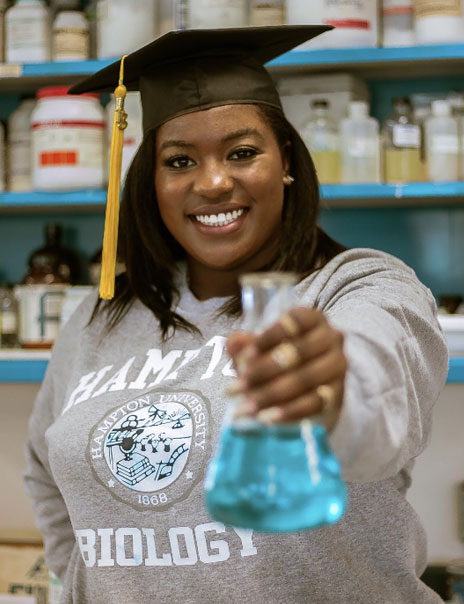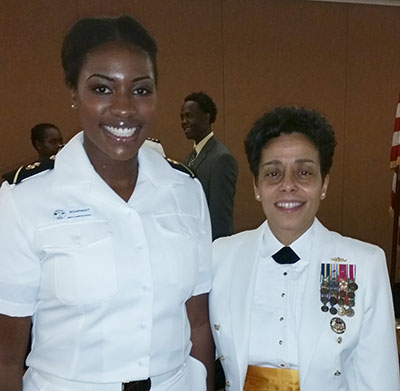
As a child, Kayla Bouknight knew she was going to follow her parents and join the Navy. That was the future. However, fate intervened. A biology major at Hampton University, the Reserve Officers' Training Corps (ROTC) cadet was leading her first run when she slipped and tore her MCL.
“I fell into a ditch,” she says, now able to laugh about it. She kept running, however, since “it didn’t hurt that bad.” As the day went on, it got worse. Bouknight saw a doctor and started physical therapy but, eventually, it was clear her injury was more serious than she thought, and she eventually had to get surgery.
Her Naval hopes were dashed.
“Not commissioning was one of the hardest things I’ve ever gone through,” she says “That was my life. I couldn’t believe that I wasn’t going to walk across the stage in all white after all the hard work and dedication I put in.”
Bouknight was mulling over alternatives when she just happened to be heading to a physics class and saw a poster for the NREIP program. She applied, was accepted, and spent the summer of 2017 at the U.S. Naval Research Laboratory (NRL), where she interned in a biochemistry lab. She returned to the lab again that winter.
“I didn't even know NREIP existed – I hadn’t been exposed to it even while in ROTC,” she says. “I was like, ‘wow, this is something that I would really be interested in applying to.’ It was almost like it was supposed to happen. And it has opened so many doors.”
One door it opened: Publication in a highly regarded academic journal. Bouknight is now the proud lead author of a paper published in Biochemical Pharmacology titled “Structural and kinetic evidence of aging after organophosphate inhibition of human Cathepsin A.” The publication was the direct result of research she participated in while at NRL, during which Bouknight asked a question that changed the scope of the research.
“We were testing the activation of these enzymes and I asked ‘why don't we test their reactivation? You know, what would that do?’” Her mentor, Dr. Patricia Legler thought about it and eventually came back to Bouknight to say, “That’s brilliant. We have to start on this.”
Bouknight calls it a “random question” but a “cool moment” in which she was able to add to a project at such a high level. “We got a lot of data from testing the reactivation of the enzyme,” she says.
“Her input was extremely valuable all around,” says Legler, herself an eminent research biologist.
Now, Bouknight is a government contractor for the Office of Naval Research. As a Senior Research Analyst, she manages various projects for the Warfighter Performance sector. Her role is to help support naval advancement in biotechnology and maintain technological leadership and economic competitiveness. She also supports the Historically Black Colleges and Universities and Minority-Serving Institutions (HBCU/MI) Science Program and NREIP programs at ONR.
As it turns out, NREIP and the career she embarked on have turned out to be a better fit for Bouknight than commissioning. She now plans to go to medical school, something she feels like her career in science has prepared her much more for than if she were to have become a Naval officer.

“Thank goodness I am not driving a ship right now,” she says. “I don't think I would've really been happy doing that because I wouldn't have been able to do what I really wanted to do, which is in healthcare. So, I just don't think that I would've been happy for those first four years before I was able to go and do something else with.”
In addition to the opportunities NREIP afforded her, Bouknight attributes her success to the mentorship she received at NRL and notes she still keeps in touch with her mentors, particularly Legler, who she says is one of her biggest cheerleaders in life.
It’s been Legler, for example, who initially pushed her to look at MD programs, as well as the microbiology Ph.D. programs she was considering. (“She would be a great doctor,” Legler says. “But then, I believe, she would succeed in anything she goes after.”)
“I’ve always wanted to be a physician but had a lot of self-doubt about my dream actually coming true,” Bouknight says. “When I expressed my doubts to Pat, she encouraged me to apply, especially because of my outgoing personality. To this day, she asks me if I applied yet and even provides me with schools and programs to look into. She's just this constant encouragement and constant support. We can go years without talking, but if I reach out to her for something she never hesitates to help me with whatever I need.”
Some of the confidence, Bouknight now says, comes from her experiences at NRL.
“I have learned a lot about myself over the years and can attribute a lot of my successes to my time spent at NRL,” she says.